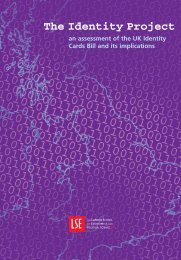Money Laundering: Review of the Reporting ... - Dematerialised ID
Money Laundering: Review of the Reporting ... - Dematerialised ID
Money Laundering: Review of the Reporting ... - Dematerialised ID
You also want an ePaper? Increase the reach of your titles
YUMPU automatically turns print PDFs into web optimized ePapers that Google loves.
kpmg<br />
<strong>Review</strong> <strong>of</strong> <strong>the</strong> regime for handling Suspicious Activity Reports<br />
Report <strong>of</strong> recommendations<br />
KPMG LLP<br />
Rejection <strong>of</strong> poor quality SARs<br />
7.4.7 It is clear that ECB is currently forced to allocate significant time and resource within its<br />
ongoing processes because <strong>of</strong> <strong>the</strong> submission <strong>of</strong> poor quality SARs by disclosing entities.<br />
In order to drive up <strong>the</strong> quality <strong>of</strong> reporting by disclosing entities, and as a key part <strong>of</strong> its<br />
ongoing role, ECB should <strong>the</strong>refore reject poor quality SARs submitted by disclosing<br />
entities.<br />
7.4.8 There should be a number <strong>of</strong> reasons for rejection:<br />
• Inappropriate method <strong>of</strong> submission <strong>of</strong> SAR: if a SAR is provided to ECB in an<br />
inappropriate form, such as where a manual submission is provided by a regulated<br />
entity where no exemption has been given for not reporting electronically (see section<br />
6.4.2 above), this should be sent back to <strong>the</strong> disclosing entity by <strong>the</strong> DMC with an<br />
explanation that this is <strong>the</strong> case and a request that it be submitted appropriately.<br />
• Incomplete SAR: if all <strong>the</strong> mandatory fields required on <strong>the</strong> SAR are not filled in or<br />
if a disclosing entity has not provided all <strong>the</strong> necessary information, <strong>the</strong> DMC should<br />
return <strong>the</strong> SAR to <strong>the</strong> relevant entity with a request for additional information to<br />
complete <strong>the</strong> SAR. It should <strong>the</strong>n be <strong>the</strong> responsibility <strong>of</strong> <strong>the</strong> disclosing entity to<br />
obtain <strong>the</strong> missing information and re-submit <strong>the</strong> SAR.<br />
• Poor quality SAR: a SAR could be <strong>of</strong> poor quality for various reasons, including<br />
where <strong>the</strong>re is no obvious reason for suspicion related to <strong>the</strong> particular transaction or<br />
activity, or where <strong>the</strong> reason for suspicion is poorly explained and <strong>the</strong>refore not<br />
obvious. In such a case <strong>the</strong> LU should return <strong>the</strong> SAR to <strong>the</strong> disclosing entity stating<br />
that <strong>the</strong> SAR is not <strong>of</strong> a sufficient quality to allow <strong>the</strong> information to be used, and<br />
providing guidance on why this is <strong>the</strong> case. It should <strong>the</strong>n be for <strong>the</strong> disclosing entity<br />
to revise <strong>the</strong> SAR and re-submit it in a properly completed form.<br />
7.4.9 Where necessary, staff from <strong>the</strong> LU should visit firms which continue to have problems<br />
<strong>of</strong> quality to provide guidance for improvement.<br />
Feedback to regulators concerning <strong>the</strong> quality <strong>of</strong> disclosures<br />
7.4.10 ECB has no formal locus over <strong>the</strong> quality <strong>of</strong> reporting by disclosing entities o<strong>the</strong>r than by<br />
<strong>the</strong> use <strong>of</strong> persuasion, which it currently uses in relation to poor quality reports from <strong>the</strong><br />
larger disclosing entities. Therefore, it should establish a closer working relationship with<br />
<strong>the</strong> FSA and o<strong>the</strong>r regulators. Where <strong>the</strong>re is ongoing evidence that individual regulated<br />
entities are persistently poor reporters, and that <strong>the</strong> LU’s ongoing dialogue with <strong>the</strong> firm<br />
has not led to an improvement in <strong>the</strong> quality <strong>of</strong> reporting, <strong>the</strong> LU should contact <strong>the</strong><br />
relevant regulator.<br />
7.4.11 The LU should provide <strong>the</strong> regulator with details (copied to <strong>the</strong> firm concerned) <strong>of</strong> <strong>the</strong><br />
nature and incidence <strong>of</strong> poor reporting and <strong>the</strong> response <strong>of</strong> <strong>the</strong> disclosing entity to <strong>the</strong><br />
LU’s initial contact with <strong>the</strong>m. The relevant regulator can <strong>the</strong>n take <strong>the</strong>se issues forward<br />
within <strong>the</strong> regulatory relationship and framework. In doing so, we believe that this should<br />
primarily focus on institutions with inadequate procedures in place and those which<br />
provide low quality, defensive or insufficient reporting, and to a lesser extent on those<br />
where <strong>the</strong>y had exercised <strong>the</strong>ir judgement on some occasions which subsequently proved<br />
to be <strong>of</strong> poor quality.<br />
jo/fh/519 67









